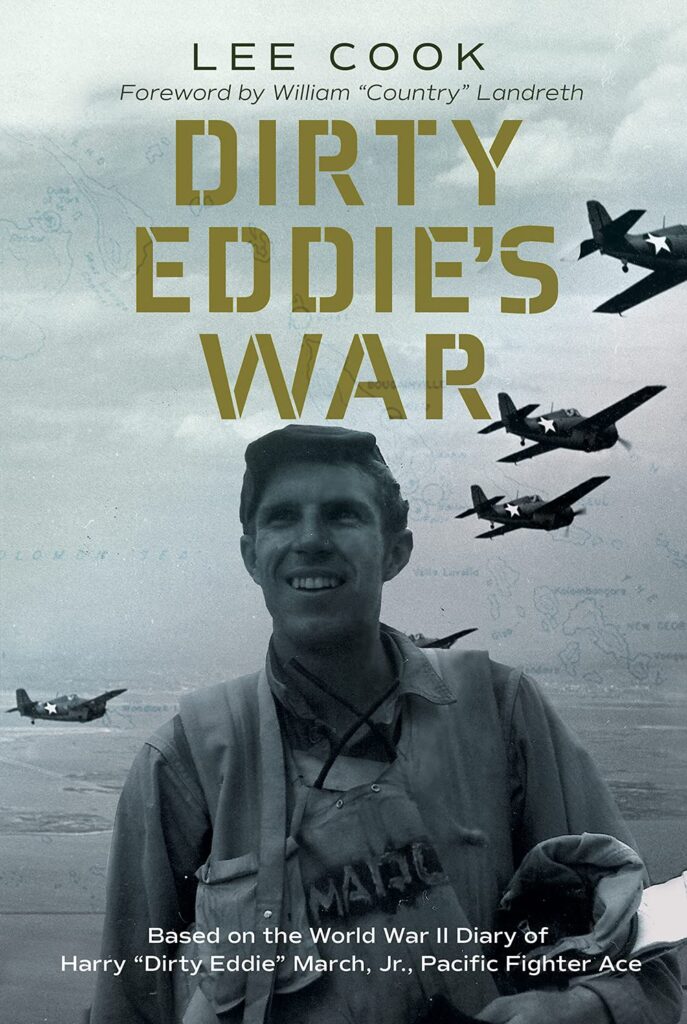Reviewed by Charles H. Bogart
This book is a must read for anyone interested in U.S. Naval aviation in the Pacific Theater during World War II. Lt. Commander Harry “Dirty Eddie” March Jr. joined the Navy in December 1940 and pinned on his naval wings in August 1941. He would serve in the Pacific Theater during the course of World War II and be promoted from Ensign to Lt. Commander. Along the way he gained the distinction of being designated an Ace, having downed five Japanese aircraft.
Contrary to regulations, Lt. Cdr. March, throughout the war, maintained a journal in which he wrote about what was happening in his life and his thoughts on the war as a whole. The journal was written so that his wife, Elsa, could understand and share in his life in the Navy. As might be expected, the entries are uneven, some of them simply a record that he was alive, while others are reflections upon his mental and physical state as he fights the Japanese in the air. A constant in his journal writings is a lack of letters from his wife and his need for them.
Lt. Cdr. March would start the war flying F4F Wildcats, move to the F6F Hellcat, and end the war flying the F4U Corsair. During 1942 he saw combat with VF-6, flying from the decks of the carriers USS Enterprise CV-6 and USS Saratoga CV-3 and the airfields on Guadalcanal. It was while on Guadalcanal that Lt. Cdr. March gained the nickname “Dirty Eddie.” This name was bestowed upon him due to the fact that he lived around the clock in the same set of flight gear. In 1943, Lt. Cdr. March was again back at sea flying with VF-24 from the deck of the carrier USS Belleau Woods CVL-24. Before the year was out Lt. Cdr. March left Belleau Woods and joined the shore-based VF-17, which was engaged in establishing aerial supremacy over Bougainville and Rabaul. In 1944, Lt. Cdr. March returned stateside to serve as an instructor at NAS Green Cove Springs, Florida. While at Green Cove Springs, Lt. Cdr. March was interviewed by the news media and an excerpt of an interview is presented in the book, The gist of Lt. Cdr. March’s comments was that the U.S. Navy provided its pilots with training superior to any other air force.
In 1945, Lt. Cdr. March became Executive Officer of VBF-74, which was part of USS Midway CVB-41 air group. While on board Midway, “Dirty Eddie” gained a regular commission in the Navy. The war ended before Midway saw combat and, with a decreased operating tempo during the winter of 1945, Lt. Cdr. March began to practice to compete in the 1948 Olympic field events. However, while at a 1946 pre-qualification Olympic event, he contracted viral pneumonia and, despite being given the wonder drug penicillin, died within days.
The book is much more than a series of wartime observations by Lt. Cdr. March. The author has woven Lt. Cdr. March’s comments into a broad story of what was happening around him This framework is based upon unit records and the personal records of those with whom he flew. The inclusion of official records provides a firm foundation to understand the context of the journal’s jottings and thus allows the reader to place them within the larger picture. This supporting text greatly amplifies the intimacy of the thoughts of Lt. Cdr. March and provides a firm understanding of the love he had for his wife.
The author concludes the book with a number of appendixes. One is a glossary used to explain in detail various names and abbreviations used in the journal; another provides short biographical sketches of fellow pilots; and yet another provides detailed biographical details on five of Lt. Cdr. March’s pilot friends, two were killed in combat, two died in aircraft accidents, and one survived the war to be discharged from the Navy.
This book can be read on two levels: that of a man’s wartime experiences or that of a man deeply in love with his wife. However, no matter how the book is read, the reader will, when finished, have looked into the heart and soul of an average American caught up in the turmoil of World War II and understand why some have referred to them as the Greatest Generation.
Charles H. Bogart recently published A Kentucky Boy in the U.S. Navy: 1958-1961
Dirty Eddie’s War. By Lee Cook (Denton, TX: University of North Texas Press, 2021)


